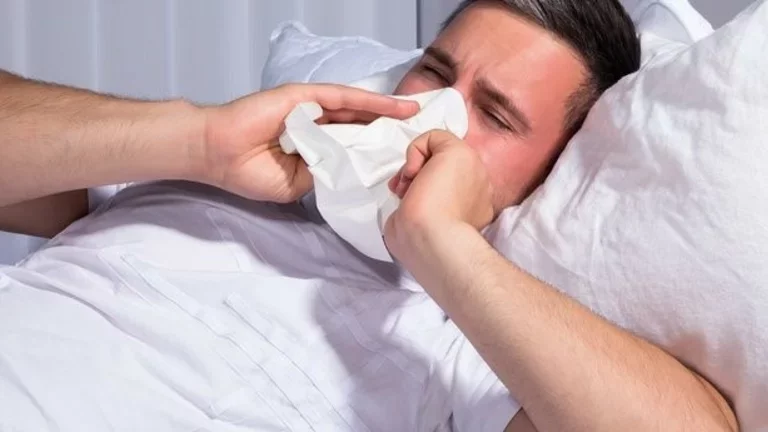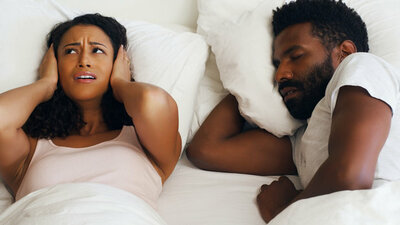Use your CPAP and avoid the flu
It’s a beautiful Winter morning but oh no, you’ve got the sniffles! Nobody likes the flu, and the end of December is typically when the flu invades Canada with coughs, sneezes, and sick days of plenty. So how can you protect yourself from the flu and other respiratory infections?
There is a natural, enjoyable, and often overlooked way to help your body stay healthy during the Canadian winters. You guessed it; sleeping well can help you prevent those sickly sniffles and research can explain why that happens.
Can sleeping less make you unhealthy?
In the 1980s, scientists noticed that sleep deprivation weakens the immune system and affects the mechanisms that help us fight off diseases. In fact, it became evident that the effects of both; sleeping less than usual and low quality of sleep, was correlated to an increased risk of contracting flu and other respiratory viruses.1
In 2009, the definitive link was established when 153 healthy men and women and their sleep habits were compared with these people’s susceptibility to a common cold virus, rhinovirus. For two weeks, participants’ sleeping habits and quality of sleep were questioned and recorded. At the end of the 14 days, the brave volunteers were given an infectious dose of the virus rhinovirus, under proper ethical approval.
Over the coming days, some of the participants came down with the full flu infection while others were only mildly affected, or did not get sick at all! Scientists charted and mapped the results and found out that those participants who slept fewer than seven hours were almost three times more likely to contract an infection than those who had eight or more hours of sleep.2
More recently, research done at Washington State University in Spokane has gained some insight into why a good night's sleep is such a great medicine against sickness. Sleep is associated with a brain protein called AcPb, and was shown to speed up recovery from the H1N1 flu in infected lab mice.3
The twin study: same genes, different sleep habits
The same was concluded from an interesting twin study that examined 11 pairs of identical twins with different sleep habits. The twin with chronically reduced sleep had a weaker immune system. "The immune system functions best when it gets enough sleep" said lead author Dr. Nathaniel Watson, co-director of the UW Medicine Sleep Center at Harborview Medical Center.4
Sleep apnea and the immune system
Since untreated sleep apnea leads to fragmented, poor quality of sleep, successfully treating your sleep apnea will get you healthy sleep and a natural immune system booster for fighting off infections.
Unfortunately, excellent sleep does not guarantee a year free of flu!
Practice these Must-Do’s around Flu Season to stay healthy:
- Get Your Sleep: Sleep really is good medicine. Try to curb your normal activities and avoid stress if you’re feeling an oncoming sickness, so you can give your body the maximum opportunity to heal itself.
- Medical Professionals: encourage getting the flu shot!
- Wash your hands often. To protect others in your household from getting sick, lather up with soap and wash for at least a full minute. A facemask will also help stop the spread.
- Cough / Sneeze into your elbow or cover your nose and mouth with a tissue: As many as 19,500 flu viruses can be expelled with just one sneeze. Then throw the tissue in the trash.
- Keep hydrated. Sipping water or tea will help thin mucus secretions in the lungs so you’ll breathe a bit easier.
- Use a pain reliever if recommended by your doctor to ease the aches and pains that come with the flu.
- Get steamy. If you’re feeling congested, take a long extra warm shower and let the steam help loosen trouble-causing mucus.
- If you’re sick: Stay at home. Sharing is nice most of the time, but not when you have the flu. If you must leave your home, consider wearing a facemask to help prevent spreading the virus to others.
If you want to learn more about sleep disorders, sleep apnea diagnosis, and therapy, contact us today! We wish you a wonderful winter season!
References:
- Sheldon Cohen, et al. Sleep Habits and Susceptibility to the Common Cold.Arch Intern Med. Arch Intern Med. 2009 Jan 12; 169(1): 62–67.
- Sheldon Cohen, et al. Sleep Habits and Susceptibility to the Common Cold.Arch Intern Med. Arch Intern Med. 2009 Jan 12; 169(1): 62–67.
- Christopher J Davis et al. The neuron-specific interleukin-1 receptor accessory protein is required for homeostatic sleep and sleep responses to influenza viral challenge in mice. Brain, Behavior, and Immunity Volume 47, July 2015, Pages 35-43.
- University of Washington Health Sciences/UW Medicine. "Chronic sleep deprivation suppresses immune system: Study one of first conducted outside of sleep lab." ScienceDaily. ScienceDaily, 27 January 2017.




